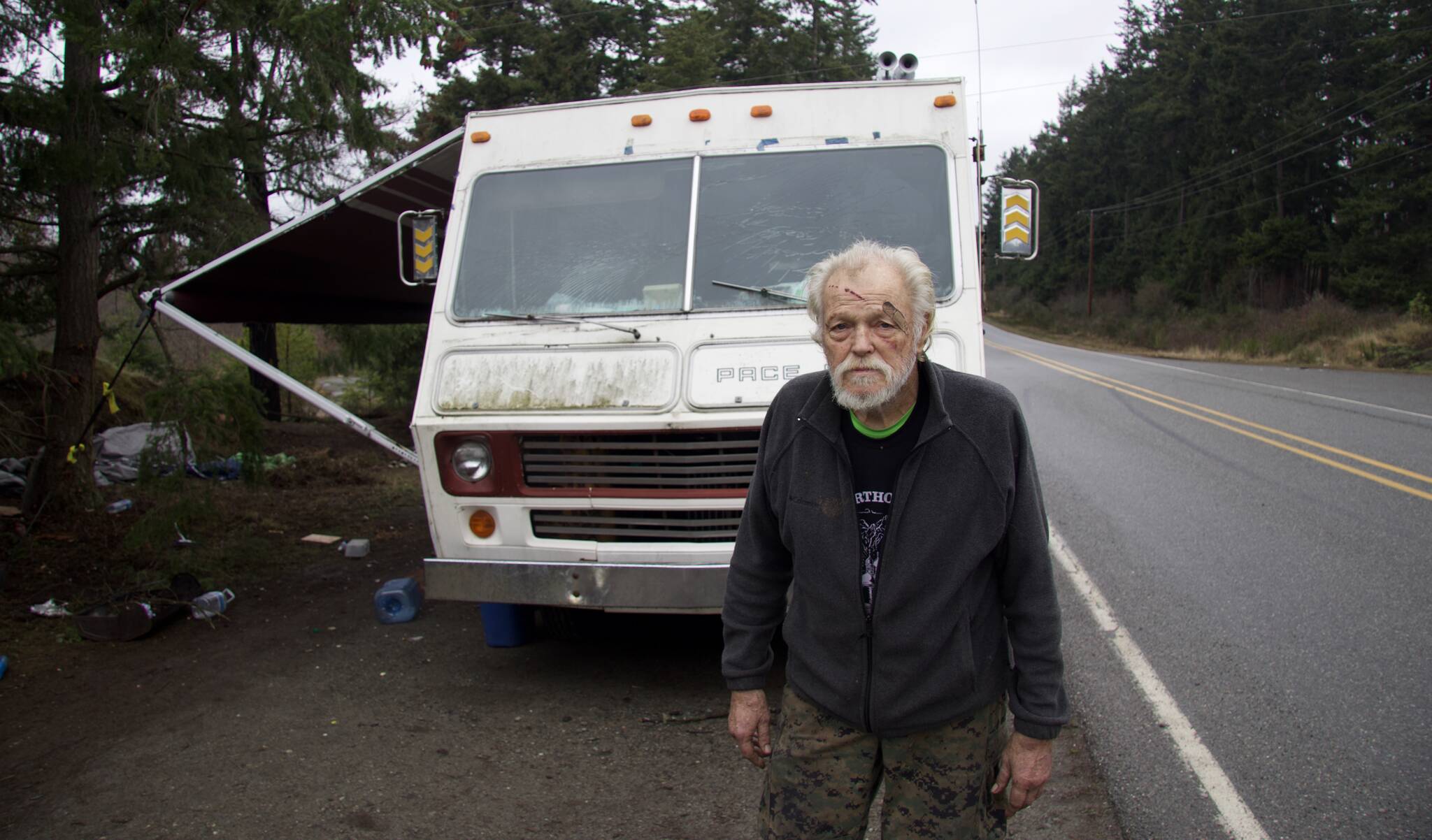Alvin Kent, a 72-year-old Vietnam veteran, is one of about a dozen people who live out of vehicles in a makeshift homeless camp on the side of a North Whidbey road.
His face is covered in scratches from a fall he took when he couldn’t see in the darkness of the camp. He lives in an RV with two dogs who he said “saved his life.” But because of the animals, he can’t go to a shelter.
Kent said he has only camped on the side of the road because his RV broke down and he has no other options.
“I’m not cut out for this,” he said. “I don’t want to be here.”
While the camp provides shelter to some, it has generated a host of concerns among neighbors, local business owners, law enforcement and social service advocates.
Two clusters of vehicles, a mixture of RVs and cars, are permanently parked on the shoulder on both sides of Hoffman Road. The vehicles appear dangerously close to traffic on the 40 mph road.
“It just keeps growing; it’s getting bigger,” said Jeff Daugherty who lives nearby.
He said the camp has been there since October or September, but that it is at its worst right now. He estimates about a dozen people are living there, along with several animals.
Daugherty and other residents are aggravated by garbage, theft and trespassing. He has seen people going to the bathroom on the side of the road.
About 30 residents, he said, drive the section of road on a daily basis.
Despite all this, there is not much that can legally be done to prevent homeless camps such as these from popping up. Island County Sheriff Rick Felici said there are a couple of court decisions that prevent law enforcement from removing people.
Martin v. Boise, a 2018 decision by the U.S. Court of Appeals for the 9th Circuit, states that anti-camping ordinances cannot be enforced on public property if not enough homeless shelters are available. Additionally, the City of Seattle v. Long was a 2021 Washington Supreme Court decision that states a vehicle cannot be impounded if someone is using it as a residence.
Felici said the department has been able to help some people at the camp find better housing but that options are “really, really scarce.”
Along with residents, businesses owners with property on Hoffman Road also want something to be done.
Lakeside Industries is an asphalt paving contractor that has a gravel mine on the street. Division Manager Richard Owens has filed complaints with the county’s public health department and code enforcement. He said the vehicles are parked right on Lakeside’s property line and he is concerned about the dumping of garbage and human waste on company property.
Miles Sand and Gravel owns property on the other side of Hoffman Road. Security Coordinator Erin McCartney said members of the camp have blocked gates to the company’s property and dump trash. In addition, the business has experienced an increase in theft of batteries and other equipment.
McCartney said the company has been working closely with the Island County Sheriff’s Office but understands that the laws limit what can be done.
Felici said people have every right to be frustrated with the situation. He said solutions need to occur on the legislative level, although two projects on the island to build homeless shelters may ease the problem.
For the people actually living in the camp, the situation is desperate and equally complicated.
One resident, who wished to remain anonymous, said she has nowhere else to go. Police kicked her out of parking lots after she was there for more than a couple days. She has a job that causes her to miss the cut-off time to go to The Haven shelter. She said she thinks members of the camp are quiet and are not disturbing nearby neighbors, but cars that drive down the road can be aggressive and sometimes swerve toward the trailers.
She said she used to stay in a nearby park-and-ride lot, but it was eventually shut down by the state when a homeless camp took over. This is something Felici said has been happening throughout the region.
“When they got kicked out of park-and-rides and rest areas around the state, we knew they were going to go into roads and city streets,” Felici said. “It didn’t solve the problem, it just spread it around.”
In an attempt to prevent the problem from getting worse, Felici said the deputies in the department interact with members of the camp almost daily to keep disturbances at a minimum. He said there is a collaborative effort with Island County Human Services to send mental health professionals to the site to help the people access services and look for other shelter.
Island County Code Enforcement has been involved to try to deal with such issues as trash and human waste.
“We’re doing what we can within the law,” Felici said.



